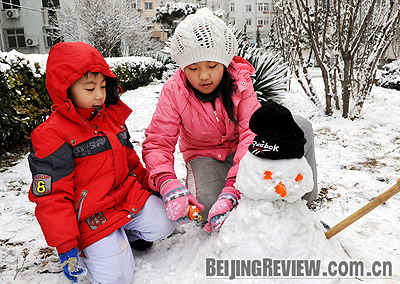|
|

FUN IN THE SNOW: Chinese medicine helps to build healthy bodies that enable people to survive the chills of winter |
Since ancient times, the Chinese have believed that there is a relationship between diet and the seasons, such as eating radishes in winter and ginger in summer to maintain good health. The belief stems from the influence of Chinese medicine on good health practices based on the changes of nature. China's earliest medical book Huangdi Neijing, also known as The Inner Canon of Huangdi, the fundamental doctrine of Chinese medicine for over 2,000 years, clearly promotes the principles of maintaining good health through adjusting the state of mind and spirit and being careful about the food and drinks one takes.
The following are some basic principles from Chinese medicine on maintaining good health in winter.
Conserve energy
Qu Limin, an associate professor at the Beijing University of Chinese Medicine, said in her book The Inner Canon of Huangdi--Wisdoms of Preserving Good Health that the ancient medical texts insists people need to conserve and store up their energy and vigor, matching the characteristics of the season. Chinese medicine says that in winter nature accumulates energy in order to prepare for the growing process of spring.
For example, Qu writes, in winter some animals choose to hibernate through the cold months, during which they could conserve their energy and prepare for the coming spring. Chinese medicine holds that man should also follow this natural law, as the metabolism of the human body moves at a relatively slow pace in winter.
Putting it in words that are easy to understand, Qu explains that this principle means that people should try to keep a placid mind in winter. "They should control their mood, trying to avoid getting angry and having big turbulences in emotion," she said. She also advises people to expose themselves to sunshine as much as they can in winter, as a lack of sunshine could cause depression.
Cold prevention
Qu said that another principle mentioned in The Inner Canon of Huangdi is that during winter, people should go to sleep early at night and get up late in the morning. "It's better to get up when the sun has risen, as the mind is clear and the brain works well at that time," she said.
At the same time, Qu adds, the indoor temperature needs to be kept stable, between 18-22 degrees Celsius. Opening windows and ventilating rooms should also not be neglected.
To prevent the common cold, a person's back needs to be specially protected, according to The Inner Canon of Huangdi. Qu said if the back gets cold, one could contract an infection of the upper respiratory tract or suffer a reoccurrence and worsening of some lingering illnesses. "It is more important for seniors, children and people who suffer from cardiovascular diseases to keep their backs warm," Qu said, adding this is why Chinese people often wear a vest in winter.
Keeping one's feet warm is also important, as they have little fat and lose heat quickly. According to Chinese medicine, acupuncture points on the sole of one's feet are closely related with the internal organs, so if the feet become cold, one could catch cold or get pains in the abdomen, waist or legs.
Qu said that to keep the feet warm a pair of shoes that fits one's feet well is crucial. Apart from this, exercising the feet to increase the circulation of blood is also important. Finally, Qu said a traditional way of keeping good health for Chinese people is to dip the feet in hot water. This is an effective way to prevent a cold, soothe fatigue and improve the quality of sleep.
Proper diet
In winter, maintaining body heat is crucial for good health.
Tan Xinggui, a nutritionist at Hunan University of Chinese Medicine, said in an article on www.cntcm.com.cn, the official website of the China News of Traditional Chinese Medicine, that the digesting and absorbing capability of one's body is stronger in winter than in other seasons, and appropriate food supplements can improve the immunity of one's body and prepare the body for the following seasons. A well-known Chinese saying, "Complementing the body in winter, one will defeat a tiger in the coming spring," also reflects this belief.
Tan proposes that the diet in winter needs to consider the following aspects: resisting the cold, preserving warmth, preventing dryness and having nutrition. Chinese medicine suggests people protect and maintain the normal function of their kidneys in winter. Based on this principle, people are advised to eat salty food that is helpful for the functioning of the kidneys in winter, such as kelp, laver and jellyfish.
Tan also points out that some food can help people withstand the cold, such as mutton, longans, walnuts, chestnuts, dates, Chinese yam, and edible fungus. He stresses that according to Chinese medicine, in winter people should avoid eating "cold" food, such as crabs, sea shrimp, watermelons and grapes.
Apart from these, Tan said hot pot (in which meat and vegetables are cooked in boiling water), one of the traditional and popular Chinese dishes in winter, soups and gruels that have various nourishing ingredients are also good choices for people to eat in winter to warm the body.
Carrot Gruel
Ingredients: Fresh carrots, millet (or rice)
Cooking method: Cut the carrots into pieces and then put them into boiling water together with the millet (rice). Cook for some time until the ingredients are soft.
Nutrition analysis: In Chinese medicine, carrots can supplement blood, provide energy to the body and help digestion. The gruel is suitable for people in different age groups, especially sick and elderly people. It is also helpful to alleviate skin dryness and night blindness.
(source: www.39.net) | 